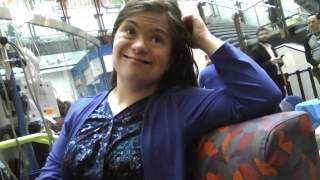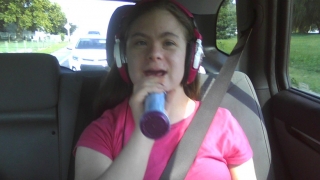Motility Disorder: Arianna’s Story
Published on
Published on
Arianna, 21, has been treated her entire life for Down syndrome (trisomy 21), autism and motility disorders. Her care is complicated because she is often unable to explain when she is in pain. But her medical team at Children’s Hospital of Philadelphia has worked closely with her family to maximize her quality of life and effectively treat her motility disorder to bring her comfort.
 Shortly after she was born, Arianna was diagnosed with Hirschsprung’s disease, an intestinal disorder in which an important set of nerve cells (ganglion cells) are missing from the intestine. Without these ganglion cells, the valve at the end of the colon or large intestine does not relax to allow defecation. In Arianna’s case, it was a life-threatening condition. At 2 days old, she was transported to Children’s Hospital of Philadelphia (CHOP), where the affected portion of her intestine was surgically removed.
Shortly after she was born, Arianna was diagnosed with Hirschsprung’s disease, an intestinal disorder in which an important set of nerve cells (ganglion cells) are missing from the intestine. Without these ganglion cells, the valve at the end of the colon or large intestine does not relax to allow defecation. In Arianna’s case, it was a life-threatening condition. At 2 days old, she was transported to Children’s Hospital of Philadelphia (CHOP), where the affected portion of her intestine was surgically removed.
Over the years, Arianna was diagnosed with other conditions, including Down syndrome, autism spectrum disorder and a hearing impairment. Her doctors also found that she had a significant sensory delay in responding to pain and other physical sensations. Her response would often come the next day, which made it difficult to diagnose and treat her problems.
Arianna also had trouble communicating when she was uncomfortable or in pain. For example, while walking upstairs, she would suddenly stop moving and become unresponsive. As it turns out, her knees and hips were spontaneously becoming dislocated, which must have been extremely painful. It took surgery on both hips and knees to correct the problem.
Even after surgery for Hirschsprung’s disease, Arianna continued to have problems with motility — the movement of food and digested matter through her intestine. Because of her sensory delay issues, treatment with an enema might not trigger a bowel movement until the following day.
Arianna’s medical team and parents were determined to find ways to better understand and predict her responses, so they could more effectively manage her issues. They would try different treatments, give her time to respond, and then try again. By closely evaluating her many responses, they would get an idea of what was working and what wasn’t.
Arianna’s treatment for her motility disorder is led by John Boyle, MD, a pediatric gastroenterologist in CHOP’s Division of Gastroenterology, Hepatology and Nutrition, and the Clinical Program Director for the Suzi and Scott Lustgarten Center for GI Motility. The Suzi and Scott Lustgarten Center for GI Motility has a multidisciplinary approach to care. In addition to seeing physicians, patients and their families are provided with additional support and resources.
Arianna’s support at CHOP also includes the Dove Center for Voiding and Bladder Function. As one of the largest, most comprehensive clinics in the United States devoted to pediatric bladder and urinary tract dysfunction, CHOP’s DOVE Center specializes in rooting out and treating the causes of bedwetting, constipation and urinary tract infections. Her support team also includes Joy C. Kerr, MSN, CPNP, a nurse practitioner in the Division of Urology, along with dieticians, social workers and child life specialists.
Dr. Boyle and his team have become experts in understanding and helping Arianna, who is in many ways, a unique patient. Solutions that work for typical patients don’t always work for her. In helping Arianna, they consult with her parents, Valerie and David, and take their opinions and observations seriously.
“What I really appreciate about CHOP is the team approach. As a parent, I feel like I am part of a team.”— Valerie
“I also appreciate their honesty. They admit that they don’t have all the answers; that they don’t know what the future holds for Arianna. But they are determined to provide the best possible care for her, and they don’t give up. If something doesn’t work, they will try something else,” says Valerie.
When treatment with daily enemas started to cause Arianna pain, Dr. Boyle suggested the placement of a cecostomy tube, a tube that feeds into the colon through a small insertion in the lower abdomen. The tube allows the administration of enema fluid and, if needed, other medications in a way that causes less discomfort. That change made a huge difference in the quality of Arianna’s life.
 To make the regular visits to CHOP more enjoyable, Valerie employs a behavior management technique she calls “karaoke therapy.” Arianna once watched another patient sing in a karaoke session at the Hospital’s Seacrest Studios. When he finished, Arianna asked if she could try it. She put on the headphones, sang, and discovered that she loved it. She left with a DVD of her performance, which she watched over and over again at home.
To make the regular visits to CHOP more enjoyable, Valerie employs a behavior management technique she calls “karaoke therapy.” Arianna once watched another patient sing in a karaoke session at the Hospital’s Seacrest Studios. When he finished, Arianna asked if she could try it. She put on the headphones, sang, and discovered that she loved it. She left with a DVD of her performance, which she watched over and over again at home.
Now, Valerie schedules karaoke appointments at the studio to follow Arianna’s medical appointments. “She’s a karaoke queen,” says Valerie. “The day before an appointment, she writes down her list of songs to sing.” So instead of focusing on what can be an uncomfortable medical exam, Arianna is thinking about the karaoke sessions. And that’s what she remembers about the visit to CHOP when she gets home.
Arianna is about to start another connection with CHOP, as a volunteer. She’ll be trained to help the child life specialists, handing out crayons and other art supplies to young children. “She does volunteer work for other agencies,” says Valerie. “In thinking about other opportunities, CHOP was first in her mind. She’s spent so much time there, it’s like a second home. Now she’ll be able to contribute in a useful way.”
The love for CHOP is a family affair. Arianna’s older sister was also treated at the Hospital as a child and now works with the Connelly Resource Center while she pursues a degree in social work.
“When you have an appointment, you feel like you and your child are the most important people in the world. We have never felt rushed. They have always taken time to answer my questions. And they always focus on the needs of the child. That’s the key. I wish all hospitals were more like CHOP. ”